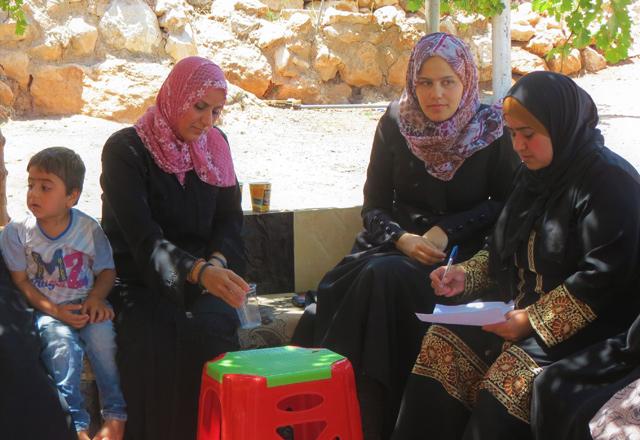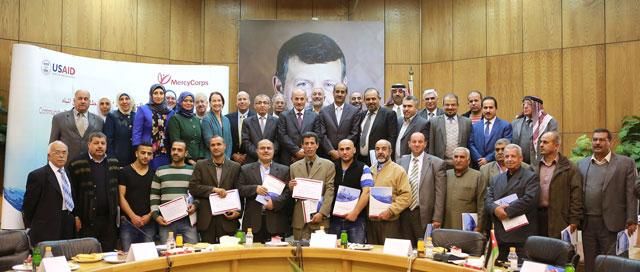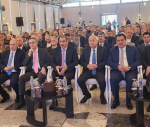You are here
Local women ‘take the lead ‘ on social change through ‘kitchen meetings’
By Emily Rohof - Aug 02,2018 - Last updated at Aug 02,2018

Women discuss local issues in Wadi Rajeb area in Ajloun recently (Photo by Emily Rohof)
AMMAN — Dozens of Jordanian women from around the Kingdom have come together in "kitchen meetings", an innovative platform created for them to discuss issues they face in their local communities, free of societal judgment.
The "kitchen meeting" format was launched last month by the Arab Network for Civic Education (ANHRE), which sought to "engage women and assess their needs through providing them a platform to express their needs and ambitions”, according to ANHRE’s Project Coordinator Tasneem Homouze.
Being set in a neighbour’s house as part of the Women Empowered for Leadership Project (WE4L), the "kitchen meetings" provided a more attractive and easy to access form of gathering for housewives, who usually did not get involved in governmental decision-making.
“Some men fear that the women leaders might influence their wives, so they don’t allow them to participate in any activities conducted by us as a community-based organisation,” explained Abla Alhajia, president of Tafilah’s Ladies of Al Hassa Charitable Society.
“When my husband prefers someone else during the elections, I can’t vote for the one I want. Most of the men select for us,” said a woman participating in a "kitchen meeting" in Tafileh, where the issue of women’s political participation was raised.
"Through the kitchen meetings, the women became engaged, creative and even initiated new plans," Homouze told The Jordan Times, citing the examples of women in Tafileh who started advocating for a bus station and Madaba women who initiated a project to sell their own products in a nearby forest.
By being on the ground in different parts of Jordan, ANHRE recognised and respected the variety in the women's wishes.
In Azraq, for instance, women expressed their desire to see their daughters work in the tourism sector, which is currently reserved to males. Meanwhile, in Maan, the core issue was the improvement of maternity care in the region.
After these gatherings, information on the women’s needs and ambitions are collected to later be communicated by the community based organisations and ANHRE to the municipality’s officials.
“We managed to be a bridge between these women and local decision-makers,” Sozan Sawalha, a female leader in Irbid, rejoiced.
“As a result, WE4L is more inclusive and we — the focal points — can create a deeper understanding of the communities and reach the unreachable women,” one woman leader from Jerash Kawthar Krishan continued.
For Samar Jubran, the country programme coordinator of Hivos, the international NGO that initiated WE4L, women's engagement is "very important" for all kinds of development. “Women’s capacities and knowledge form half of human’s capital, so investing in them means achieving sustainable development goals for the society as a whole,” she told The Jordan Times.
Now that the kitchen meetings concluded, the communities are scheduled to launch 38 local and national events aimed at facilitating networking and advocacy of topics determined during the project, a report by ANHRE stated.
Meanwhile, nine community-based initiatives are ready to be launched, aiming to reach more women, stimulate the integration of gender issues in governmental plans, and change societal perceptions of women and attitudes towards women.
“Real steps are being taken to create a women network to exchange experiences, and inspire each other which will ultimately help bring women to leadership positions locally and nationally,” Jubran concluded.
Related Articles
AMMAN — The Arab Network for Civil Education (ANHRE) on Sunday launched the project “Empowering Women for Leadership”, aimed at encouraging
AMMAN — UNDP has signed cooperation agreements with 25 community-based organisations from various governorates of Jordan, with the aim of en
USAID has awarded $880,000 (around JD623,400) to 28 charitable and cooperative societies in Irbid for the installation of 44 rainwater-harvesting cisterns and other community-based water projects in northern Jordan.















